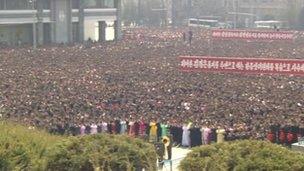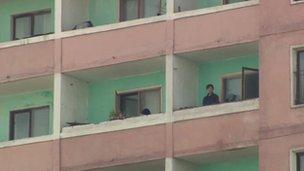Peering behind North Korea's celebrations
- Published
- comments
Celebrations began with a crowd of tens of thousands in the centre of Pyongyang
Central Pyongyang was a sea of faces today, a crowd perhaps a hundred-thousand strong packing the open square.
What was extraordinary was the way they all acted on cue, as one, clapping together, bowing together, waving their pink floral batons in unison.
North Korea has begun what it says will be the biggest celebrations in the nation's history, to mark the 100th birthday of the reclusive state's founder Kim Il-sung and the rule of his son Kim Jong-il too.
Both Kims are now dead and the North's current ruler is the third in the dynasty, Kim Jong-un.
I am among a group of journalists who have been invited to the usually closed country to witness the events.
This event in the capital was the unveiling of a giant mosaic of the former leader Kim Jong-il who died last December. The huge picture has been erected on a hill right next to a similar mosaic of his father, the North's founder Kim Il-sung.
The unveiling marked the start of a week of celebrations for the centenary of the elder Kim's birth. It was accompanied by speeches, blaring over loudspeakers, extolling the virtues of the two Kims.
The massed ranks of Pyongyang's citizens below bowed to the new portrait. The symbolism couldn't have been clearer. Although this week's celebrations are meant to be a birthday party for Kim Il-sung, they are also about fixing Kim Jong-il's position in North Korea's pantheon.
New Supreme Leader
Kim Jong-il has been officially elevated, posthumously, to sit alongside his father as another almost godlike figure. The hope must be that it will help ensure the dynasty continues to hold North Korea's people in thrall.
Later this week the third in the Kim line, Kim Jong-un, the son of Kim Jong-il and the grandson of Kim Il-sung, is expected to be formally given the title of Supreme Leader. He is not even 30 years old. But he is already ruling North Korea and needs to have his role confirmed by the Korean Workers' Party and the rubber stamp legislature.

The crowd in the capital Pyongyang bowed as the new mural of Kim Jong-il was unveiled
With this week's events the regime hopes to convince its people that their nation has been turned into a powerful, prosperous land. Most outsiders wouldn't view North Korea that way.
Instead, watching the mass celebration, it seems what sustains North Korea is the personality cult built around the Kim dynasty, and a system of totalitarian control.
As the hundred thousand people filed out of the square our group of journalists was hurried away by our minders. We were told we could not interview a single one of the crowd who had been present and were hustled away.
Inspired by Kims
Instead we were taken to a model silk-spinning factory in Pyongyang. Women in headscarves manned huge machines that boiled the silk cocoons, then extracted and spun the thread. Steam hung in the air.
The general manager, himself an official hero of industry, told me that the factory has never fired a single worker, they all toil so hard.
Apparently it is all down to the generous guidance of the two elder Kims; both Kim Il-sung and Kim Jong-il have visited the factory and given, we were told, invaluable guidance.
The factory handles 80% of North Korea's silk production, generating $20 million (£12.6 million) a year. But it's not quite the model of North Korea's spirit of Juche, or self-reliance, extolled by the Kims. The machinery is all imported from China and Japan.

Away from the celebrations the uniformity of life hints at a less prosperous country
Portraits of the two elder Kims looked down from the wall as workers sat behind computers getting interactive instruction in mathematics, physics, and English.
"This birthday celebration for Kim Il-sung is the biggest national event in our country," one woman told me, adding, "I am going to celebrate by working even harder."
If the propaganda is to be believed the 2,000 workers are no slackers. Chang Yong-ok has worked at the factory for nearly 30 years. Like everyone we were allowed to talk to, she stuck to the same script, insisting Kim Il-sung and Kim Jong-il deserve the credit for everything.
"When they were alive they instructed us to provide clothes for the people," she told me proudly. "This year we have exceeded our annual quota in just three months."
But although North Korea has invited us in to witness the celebrations, ours is a tightly controlled visit. Where we go and who we talk to is all organised for us.
Outside though as we drive through Pyongyang, through the windows of our bus, are hints of a less perfect world.
There's the grey monotony of the city, the long, patient queues of people waiting for the morning tram - the drab uniformity suggesting the land of the Kims isn't quite a socialist paradise, not yet.